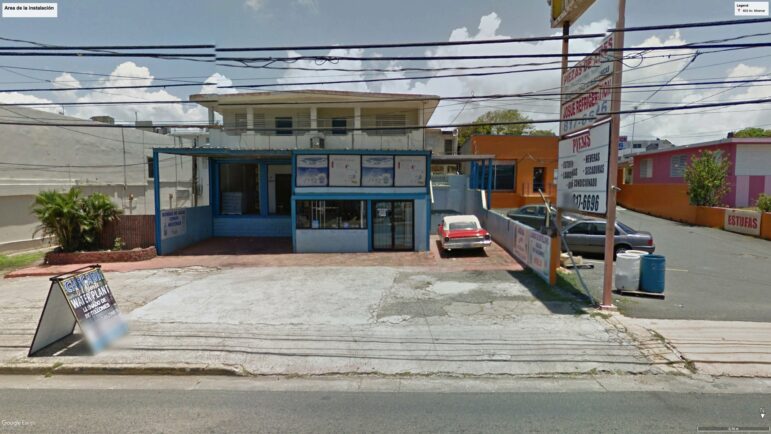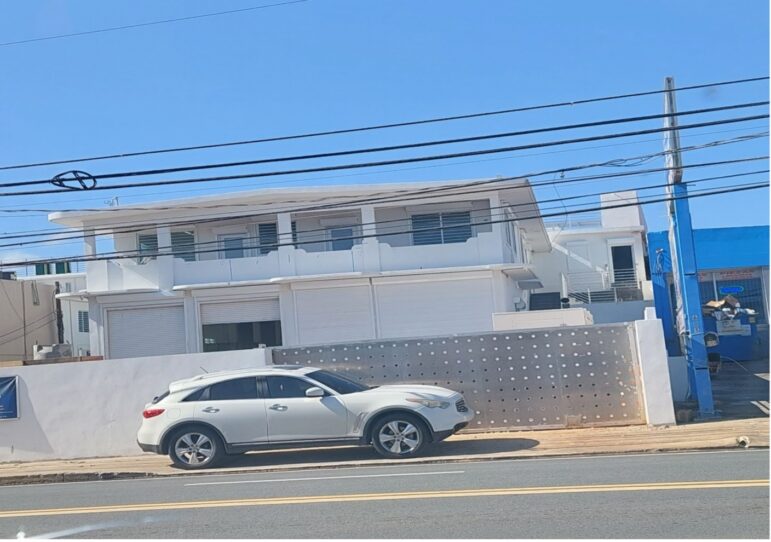Paradiso College Preparatory Real Estate Two, LLC — the corporation through which the building that houses the Alianza Paradiso College Preparatory School in Río Piedras was purchased — accepted that the unique permit it obtained to operate that charter school is invalid, and accepted that Judge Alfonso Martínez Piovanetti revoke it through the sentence handed down today, Thursday in the San Juan Superior Court. Its director and founder, Robert Acosta, vowed not to operate the educational institution until it gets the permit subject to the result of it’s location consultation.
The new charter school is in a building classified as a commercial tourist zone, which does not allow it to operate as a school. Location consultation is a necessary process, which entails public hearings when the applicant wants to change the use that a structure has according to the area where it is located.
The Municipality of San Juan went to court to revoke the permit that an authorized professional (not a regular employee) granted through the Permits Management Office to Paradiso College Preparatory and paralyze the use of the 1000 Ponce De León Avenue building, after Mayor Miguel Romero called the charter school’s permitting process “highly irregular,” in reaction to an investigation by the Center for Investigative Journalism (CPI, in Spanish). Last Friday, the city council filed the petition for an injunction against the limited liability corporation, because “Paradiso made a fraudulent and misleading representation by stating that it would be using the property for administrative offices when in fact it is a school for fifth through eighth-grade students.”
Acosta had requested an interview with the CPI scheduled for Thursday morning, but the director of Paradiso College did not show up.
On Monday afternoon, August 14, two days after school began, a location consultation for Paradiso College was submitted to the Permit Management Office’s permit system. The following day, the unique permit granted by an authorized professional was uploaded to operate administrative offices and four classrooms in the building in the urban area of Río Piedras, a college town and San Juan neighborhood suburb.
“It’s ironic that an educational institution, rather than teaching the values of a law-and-order society, acts outside the law, making false representations to achieve its goal. We wonder if this is the example that an ‘educational’ institution wants to give its students,” questioned the Municipality in the lawsuit.
However, Acosta assured on Monday that “the Planning Board, at the state level, has an administrative process that can be carried out without consulting the location. With only an administrative process with which you release the <T> of [the classification zone of] tourism, with the endorsement of the Tourism [Company], which we have. So, the location consultation isn’t legally required; It’s a practice that is carried out to obtain an <E>, educational zone, and when you go to the educational zone you look at the surroundings. Next to me, there is the UPR, educational. Puerto Rico Foundation, educational. The Vila Mayo School, educational. So, we aren’t talking about putting a five-star hotel in the middle of the Lloréns Torres [public housing complex].”
The seed capital to operate this school comes from the hedge fund registration between Paradiso CEO Robert Acosta; Brenton Nevarez, Joshua Kruger and Patrick Horsman. Kruger and Horsman are Act 22 and Act 60 beneficiaries, as is Kira Golden, who is a partner of Nevárez in other limited liability corporations, also a beneficiary of Act 60 and the original buyer of the Ponce de León building. In addition, Kruger and Horsman are part of Coral Capital, a corporation dedicated to investing in digital assets.
Act 22, and Act 60 are two laws that enable foreign individuals to invest in Puerto Rico paying little or no taxes in exchange for jobs among other few requirements.
Acosta approached these investors, “because they have a benefit in this island, I think it’s worthy and fair that these people also contribute to Puerto Rico in an economic way so that the reflection of that contribution is seen in buildings, in things that are tangible, in jobs.”
Paradiso Also Stumbles in Arecibo
On August 1, retired teacher Lizette Rullán went with her 88-year-old neighbor, Andrés Placeres, to the offices of the Environmental Quality Board of the Department of Natural and Environmental Resources (DRNA, in Spanish) in Arecibo to file a complaint against the Alianza Paradiso College Preparatory School. Both — asthma patients — allege that the gasses and noises produced by an electric power generator with which the affiliate of this charter school in Arecibo operates are unbearable.
“There they said that we had to wait about three months, while that [the complaint] was uploaded to the system, and they assigned someone, authorized them, and sent someone [to inspect]. In three months, we could already be dead,” Rullán said in a telephone conversation with the CPI, referring to the inhalation of diesel gasses.
On August 9, Rullán wrote an email to Acosta, the school’s executive director, “explaining the situation, that he could not bear the smell of that plant that he had from 7:00 in the morning until 11:00 at night. Acosta replied that he understood, but it was that LUMA (the private energy company) was not helping him, and he was working on getting solar panels. I have asthma, I went to the pneumologist, and they have me on a three-month treatment.”
The structure where the Arecibo charter school is located was the former Arecibo Soda Water soft drink factory, which later became an apartment building, Andrés Placeres told the CPI. “There were apartments there, like 30 apartments, and they destroyed everything on the inside and made classrooms. That had no telephone numbers for the contractors, the name of the company, and nothing to identify [the developers of the construction]. There were no public hearings,” he said.

Photo: Google Earth
The structure was owned by a bank, but in November 2020, PAD Capital Corporation bought it for $190,000 from Oriental Bank. The Delaware-based for-profit company was administered by Gale Smith-Camp and Lindsay Gordon. Gordon has been a beneficiary of Act 22 since 2015. On January 27, 2023, Paradiso College Preparatory Real Estate One, LLC — represented by Brenton Nevárez — bought the property for $345,000.
Placeres charged that the smoke from the electric generator “ goes inside my house and inside the neighbor’s house, who is also asthmatic. I have to be on the therapy machine all the time. I can’t even watch TV because of the noise and the smoke. I close everything in my house. Sometimes I have to get in the car and leave to be able to breathe.”
Acosta, along with a person in charge of Paradiso College in Arecibo, offered Rullán an air conditioner, and a generator for Placeres, to remedy the inconveniences that the school’s operation created on the surroundings.

Courtesy photo
“I told him that my dignity is not for sale because I live poor here, but I don’t sell my dignity for money. It looks like I’ll have to suffer here for the rest of my life or die poisoned,” Placeres said.
The neighbors interviewed by the CPI are also concerned about the children’s safety, due to the proximity of the school to Route 2, a road that they consider dangerous because of the traffic volume and speed.
“What they put up are some of those red cones when those kids get in in the morning and when they leave at 3:00, and people cross between the cars with the children, because they don’t have any parking, they don’t have space for anything,” Placeres warned.
Rullán indicated that the amount of people that the new educational institution attracts worsens access to parking because of parents who block the entrance to their homes when dropping off or picking up students. “There’s a handicapped boy passing by on the sidewalk and a lady with her baby, and they all have to use the road to get through because they [parents from the school] take up the entire road,” she said.
However, Mildred López, mother of a sixth-grade student at Paradiso in Arecibo, did not express concern about the proximity of Route 2 because the students’ entrance and dismissal times are organized by grades and there is staff in charge of the students’ exits and entrances.
López assured that “my child liked [the school] a lot. Academically I see that they’re organized. Structurally, it’s in excellent condition, it has its air conditioning. The physical education area is spectacular, they have classrooms with treadmills, and they have classrooms with stationary bicycles. They aren’t dedicated just to doing a sport as such because they also have basketball and volleyball, but those sports facilities are at the same level in the United States.” Convinced by these features of the charter school, she took her son out of a private school, where tuition fees had increased.
Regarding the fact that the institution is operating with a power generator, she did not express concern because “you don’t even realize that they are running with a power generator,” she assured the CPI.
For Adaxay Aquino, a mother who tried to enroll her son at Paradiso College in Río Piedras, the experience was very different. She said the orientation to parents was always through the WhatsApp chat application. Aquino’s son is a sixth-grade student in the Special Education Program. From the first moment she approached Alianza Paradiso School she made clear her son’s educational needs; she even brought a copy of his Individualized Educational Plan.
“I took him for three days to take some tests, to find out what he knew. He took all those tests, and I was waiting for them to call me to enroll him. Three days before school started, counting the weekend, they wrote in a chat saying that they were going to call the parents of the children in Special Education to talk to them. I immediately contacted them, and that’s when they told me that they didn’t have Special Education teachers,” she explained.
She also questioned the timing when they confirmed the lack of teachers for this student population, and to make matters worse, it wasn’t until last Friday that they called her to ask why the child had not gone to school. “I told them that I didn’t understand what kind of organization they had, that they didn’t know that they themselves had told me that the child could not be at the school because they didn’t have the resources. They aren’t organized, they’re playing around to see how it turns out,” she assured.


